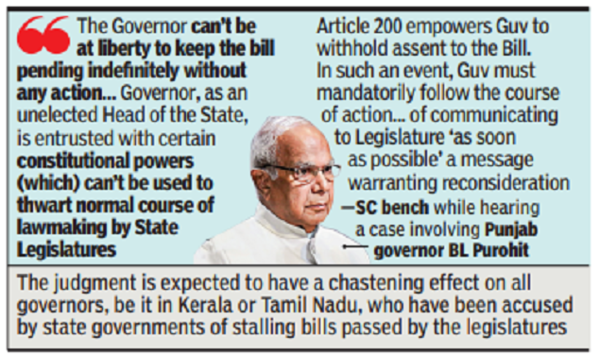From UPSC perspective, the following things are important :
Prelims level: Article 200
Mains level: Governors' discretion in reserving Bills

Central idea
Chief Justice D.Y. Chandrachud’s landmark interpretation in the State of Punjab case links the Governor’s power to withhold assent to the immediate reconsideration of Bills, safeguarding legislative rights. The judgment addresses historical delays caused by Governors and raises concerns about potential strategic reservations for the President. The article emphasizes the need for clarity on Governors’ discretion and suggests a constitutional review for a comprehensive legislative framework.
Key Highlights:
- Landmark Judgment: Chief Justice D.Y. Chandrachud’s groundbreaking interpretation of Article 200.
- Innovative Approach: CJI’s creative approach to constitutional nuances in the State of Punjab case.
- Assent and Reconsideration Link: Linking the withholding of assent to the immediate reconsideration of Bills.
Key Challenges:
- Historical Delays: Governors’ Past Practices causing prolonged delays in decision-making.
- Strategic Reservations: Governors exploiting the option to strategically reserve Bills for the President.
Key Terms/Phrases:
- Constitutional Articles: Article 200, Proviso to Article 200, Article 254.
- Governor’s Powers: Withholding assent, reconsideration, and reservation for the President.
- Presidential Consideration: Conditions for reserving Bills for the President.
Key Quotes/Anecdotes:
- Forward-Thinking Judiciary: “The CJI, in a forward-thinking approach, protects the legislature’s rights.”
- Supreme Court’s Firm Stance: “The Supreme Court emphatically states Governors cannot unduly delay the decision on Bills.”
Key Statements:
- Curbing Arbitrary Power: CJI’s interpretation limits the Governor’s arbitrary power to withhold assent without prompt reconsideration.
- Judicial Assertiveness: The Supreme Court asserts Governors’ accountability in decision-making, addressing historical lapses.
Key Examples and References:
- Governor of Kerala’s Discretion: Arif Mohammed Khan’s discretionary action in sending Bills to the President.
- Tamil Nadu Governor’s Controversial Move: Sending Bills to the President against constitutional provisions sparks controversy.
Key Facts/Data:
- Constitutional Mandates: Second proviso to Article 200 mandates reservation for the President under specific conditions.
- Article 254 Framework: Outlines conditions for a State law’s supremacy on Concurrent List items.
Critical Analysis:
- Safeguarding Legislative Rights: The judgment protects legislative rights but prompts questions about Bills reserved for the President.
- Governor’s Discretion Scrutiny: The article scrutinizes Governors’ discretion in sending Bills to the President, highlighting potential constitutional issues.
Way Forward:
- Clarification Imperative: The need for further clarity on Governors’ discretion in reserving Bills for the President.
- Constitutional Review: Examining the constitutional framework regarding Bills on State and Concurrent subjects for a comprehensive legislative landscape.
Get an IAS/IPS ranker as your 1: 1 personal mentor for UPSC 2024
